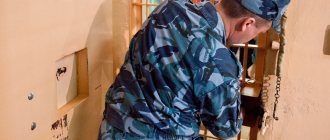“It just happened spontaneously, you know, right? You know, yes, someone shouted something incomprehensible, and it started,” recalls one of the prisoners at the Mozhaisk juvenile correctional colony, who asked that his name not be used. - What happened was that the colony staff provoked us. [Pupil] Mamedov was kicked, and we decided to stand up for him. They showed that you shouldn’t do that, and this is what happened.”
The riot began on the evening of February 21, 2016 in the building where pupils of the first and second detachments lived, all of them were on light terms of serving their sentences - this means that the teenagers had no penalties, did not violate the regime and enjoyed benefits because of this, for example, a large than usual, the number of dates; they were more likely to be paroled. There were no more than a hundred students in the entire colony, and about 55 of them took part in the riot.
At about seven o'clock, after dinner, the students returned from the dining room to the dormitory building. After that, according to the schedule, they had free time until 22:00, so the teenagers went to their rooms and went about their business - someone sat down to read a book, someone ironed their robe, and someone dozed on a chair. At about half past seven, shouts were heard in the corridor - everyone was called to gather in the gym on the second floor.
Most of the teenagers interrogated during the investigation claim that they did not go upstairs. Only a few people said that in the gym, students began to discuss violence from the colony staff. According to the protocols of their interrogations, at the meeting it was decided to barricade themselves and “not allow garbage into the detachment.” Several people wrapped T-shirts around their heads, making masks out of them to hide their faces. Some began tearing off the tags from their robes and chanting: “Ah! Uh! E!” After shouting “let’s go, let’s go!” someone came out of the hall with a barbell and blocked the front door of the dormitory.
The teenagers were left alone in the building - at the moment when the twenty-kilogram vulture fell on the door handles, Dmitry Knyazkov, who held the post of senior teacher of the colony, was on the street, he watched as two pupils threw out garbage. At 19:35, it follows from Knyazkov’s testimony, he approached the barracks and heard the sound of breaking glass. Finding that the door was blocked, he radioed his colleagues and called the head of the Mozhaisk colony, Oleg Merkuryev.
The lights in the barracks were no longer on - the employees had turned off the electricity. Pillows, a smoldering mattress, table legs, papers and stands with rules of behavior in the detachment were flying from the dark windows.
Negotiations between students and staff began almost immediately. In addition to the head of the colony, Merkuryev, whom the rioters did not want to see at first, his deputy Alexander Chernavsky, the head of the FSIN department for the Moscow region Anatoly Tikhomirov, the teacher Knyazkov, the prosecutor Palchik and two priests who regularly visited the prisoners of the colony - Father Dmitry and Father Daniil (the latter) gathered in front of the barracks. holds the post of chairman of the department for prison ministry of the Moscow diocese of the Russian Orthodox Church).
Signature
Part of their conversations with the students was recorded on the video recorders of FSIN employees. In the darkness and confusion, it is difficult to identify which of the staff and students is speaking at what moment; Apparently, for this reason, their names are not indicated in the transcript attached to the case materials. It follows from it that the first formulated demand of the convicts was a telephone to contact their relatives:
Pupil.
Either the phone or I'll open your veins.
Employee.
There will be no telephone.
The student puts his hand through the window opening and cuts the veins.
Pupil.
On, look, ***, look, fuck.
Employee.
If he dies, <nzrb>. Tie it with a bandage, don't do nonsense. So, quickly, guys, explain to me briefly what you want?
Pupil.
Phone numbers and normal attitude towards us!
During the negotiations, the teenagers constantly talked about violence in the colony, threatening to set fire to the entire building and burn down along with it. In the recording, employees can be heard reporting the situation over the phone. “Yes, hello, I’m listening. They threaten to set it on fire. They complain that they are being thrown into a rush, the stages are not being well received,” one person answers the call. Another says: “Oleg Aleksandrovich, well, they barricaded themselves, saying: “Everyone here is sending us *****, they’re beating us.”
Pupil.
***** [why] meet stages so emotionally? Why did I deserve the parasha, the answer? Where is the answer? For what? Answer! Where's the answer, *****! Answer! Bitch, ***, I'll fail, ***** [to hell], just get up, ***. I answer, bitch, go ***** [to hell] to a compromise, I’ll tell you the market. What do you want? So what do you want?
Employee.
So that you don't bomb the squad, calm down.
Pupil.
Well, as long as I said, they don't bomb.
Employee.
Alexander Viktorovich (Chernavsky, deputy head of the colony - MZ) asks not to do anything stupid. Wait ***** 15 minutes, he will arrive. Do not break the squad for 15 minutes. There will be problems later.
Pupil.
Everything is already broken, the next stage is we set everything on fire here.
Judging by the transcript, the teenagers complained most about the behavior of the guards and teachers. They shouted that the employees were humiliating them, beating them, putting their heads in the toilet, insulting them and “hurting their mother.”
Employee
. Guys, this will end badly.
Pupil
. We ***** [don’t] care about that.
Employee
. It still has to end somewhere.
Pupil
. Well, when we call, this will all end.
Employee
. So you have arranged it here, what do you want in the end?
Pupil
. For starters, fairness.
Employee
. Damn, these are all general phrases. Write specifically what you want, point by point.
Pupil
. So that they don’t beat us, don’t humiliate us.
One of the students formulated the most succinct claims during the second hour of negotiations.
Employee.
I’m telling you again, come down here and we’ll talk, we’ll find out everything, why this all happened, because maybe this information was conveyed to me in the wrong way.
Pupil.
I’m bringing you the information: the cops ****** [got crazy]!
The colony staff, who stood under the windows, in turn persuaded the pupils to come down to “talk”, promised that no one would use physical force against them and warned that otherwise “these fools” would come, you understand, you’ve been sitting for three years, nothing good will not be".
Pupil
. Why is Denis Sergeevich (Davydov, colony employee - MZ) calling the boys for a conversation today because he talks to garbage ***** [bad], although, ***** [damn], you are garbage, * **** [damn], your inspectors are hurting your mother, ***** [damn]. In general, you bitch, you should be cut for words like that.
Employee.
Okay guys, calm down. I’ll say it again, right now you can’t solve the issues with this seething mess, you understand?
Pupil
. What should we do?
Employee.
Yes, I’m telling you, Vadik, you know that this senior management will still make you guilty, not us. What the hell are you doing? Now we’ll come and sort out this crap, okay?
Already in court, the head of the colony, Oleg Merkuryev, said that not only the staff of the institution, but also the priests, who even held a prayer service under the windows of the de-energized barracks, tried to calm the teenagers down. According to Merkuryev, “some convicts even showed their bare bottoms during prayer.”
-Who was it? — the prosecutor asked.
“Well, I can’t tell from the back who it was.” But there was a backside,” Merkuryev answered thoughtfully and added after a pause. - And not alone.
Negotiations with the child rebels continued throughout the night. Three of them - Igor Kvartalnov, Vladimir Dalevich and Maxim Rumyantsev - by morning, they took turns going downstairs, unwinding the fire hose from the second floor. By this time, the mothers of Dalevich, Rumyantsev and pupil Andrei Zolotukhin had already arrived at the colony.
After talking with relatives, the teenagers calmed down and began to dismantle the barricades. The riot ended around five o'clock in the morning, when all the students were gathered in the gym and counted, and the wounds of the nine teenagers who cut themselves were treated.
Signature
Cold Summer of '53 (1987)
Genre: Action, Thriller, Drama
Rating – 8.0
The film was shot under the working title "Amnesty".
The film takes place in 1953. The lives of Nikolai Starobogaty and Sergei Basargin went downhill. The men were convicted on political charges. But when the Decree of the Presidium on amnesty is issued, everything changes dramatically. Political prisoners are released from prison, and they come into conflict with a gang of amnestied criminals. Meanwhile, policeman Mankov is trying to take control of the situation, but this task is not so easy to cope with. Almost a detective story ends both optimistically and tragically...
Ashes (2013)
Genre: Military, history
Rating – 7.3
Some scenes were filmed on the shores of the Gulf of Finland.
In a carriage compartment, a thief named Senka Pepel and Red Army captain Igor Petrov, who is facing execution, accidentally meet. One of the heroes comes up with a brilliant plan to avoid death - just exchange clothes and documents. Outwardly, the men are very similar, which means the plan should definitely work. From this moment on, the main characters begin a new life, full of dangers, adventures and adventures.
Lucky (2006)
Genre: Drama, crime, action
Rating – 6.2
“Lucky” is the only film directed by Vladimir Yakanin.
“Fartovy” is an interesting Russian film about prisoners and prison; The feature film is worth watching just for the appearance of Vladimir Epifantsev - the actor perfectly embodied the character and delighted fans of crime films. Vadim Uporov is a young guy who was sentenced to 25 years and sent to one of the Gulag camps. Finding himself in harsh conditions, he needed to gain authority and decide whether he would join the criminal group or be against it. As a result, Vadim could not go against his will and principles - the leader of the thieves, Dyak, sentences Uporov to death. To survive, Vadim arranges an escape, which was unsuccessful - he was caught and sent to a punishment cell for six months. Returning back to the barracks, Vadim was again drawn into a dangerous game between thieves. He makes another escape, and again unsuccessful. Will Uporov be able to avoid death and stay alive this time?
Pupils' complaints. "I am the law here"
On February 23, members of the Moscow Region PMC arrived at the colony. After talking with the convicts, they took with them 23 complaints of violence by FSIN officers.
Most of the complaints relate to the use of batons by guards - teenagers spoke about beatings for misdeeds and gaming practices common in the colony. So, from time to time they were forced to play the role of towns in the game of the same name, during which the guards “knocked them out” with rubber “clubs”. A colony employee named Denis Davydov perfected the game “rock-paper-scissors” - the loser received a blow from him with a baton. He forced the pupils to learn Pushkin’s poem “To Denis Davydov” addressed to his namesake, and beat those who stammered or poorly recited the lines about “the expanse of wild feasts” with a baton.
Employee Vladimir Boykov had the habit of beating with a baton for any offense, for example, for a torn button; he correlated the number of blows with a baton with the day of the calendar. “If today is the 23rd, then the same number of blows follows,” recalled one of the teenagers.
Already in court, former pupil Alexander Klykov said that the colony staff constantly abused the teenagers. “Well, let’s say you’re rubbing the floor, they could come up to you or give you a kick, or spit on you, or hit you on the back, or on the head,” he recalled. According to Klykov, the head of the colony, Merkuryev, personally took the offending pupil out in front of two detachments, took off his pants and underwear and flogged him with a belt.
According to him, the events of February 21 were led to by an incident with a colony employee Sergei Burenkov, who hit a pupil Namik Mamedov: “There was such a little boy there, and the employee hit him in the back with his leg, I saw it myself.”
One of the direct participants in the protest also says that the students were driven to attempt a riot by the colony staff: “On the day when everything happened, first they beat one boy, then they brought the second one, and when after the first incident we went to the duty room, to the DPNK (duty officer) assistant to the head of the colony - MZ), he said that we would sort everything out. In the evening another one was beaten.”
According to Mediazona’s interlocutor, he also saw the teacher hit Namik Mamedov. The teenager says that on that day, on the second floor of the dormitory, teacher Sergei Burenkov asked prisoner Ilgiz Sadekov to “make his gait simpler.” “And Namik told him: “Why are you saying that, good guy, don’t say that.” Because of this, he kicked him and kicked him. I saw it, I came over. Namik also started there: “What are you doing, why are you throwing your hands away?” I tell him, there is a law. And he says to the side: “I am the law here.”
After this, the students tried to complain by phone to the deputy head of the colony, Alexander Chernavsky, but he advised them to calm down and promised to come and personally “rip off the heads” of the teenagers.
“And that was the last straw,” says the student. — After which everyone got together, talked, and decided, so in the end it turned out to be a riot. We came to the conclusion that everyone was just tired of this and something needed to be done.”
Signature
Marked (2012)
Genre: Crime, detective
Rating – 7.9
Valery Zolotukhin said that he has not read scripts for the series with such pleasure for a long time.
The main character Oleg goes to prison. He is far from the criminal world, so for the first time he will have to face a terrible reality in which there are different values. He will have to get used to local laws, and not obeying them means causing himself a lot of trouble and problems. Oleg understands that there are good and bad people in the zone. Those who actually committed a crime and those who became victims of the judicial system. Now the life of every prisoner depends on his willpower.
Regimes and conditions of detention of minors in colonies: photos
Nowadays, educational colonies have created the best conditions for keeping teenagers. They live in small rooms for 4-5 people, each of which has its own TV, refrigerator, and work desk. In the corridor there are several showers where prisoners wash themselves. There are no baths on the territory of the colonies. Convicts are not on duty, they only study and work. After arriving at the colony, the teenager is in quarantine for two weeks. There he gets used to local customs and adapts to a new way of life. He is also examined by doctors, interviewed by a psychologist, and then settled into a room.
Conditions in the colonies are as follows:
- Under normal conditions, they can spend monthly on the purchase of food and basic necessities the money they earned in the colony, the pensions and benefits they receive, as well as other funds available in their personal accounts, in the amount of 10,800 rubles. It is also allowed to have 8 short-term dates and 4 long-term dates during the year;
- In lightweight ones, the spending limit increases to 11,400 rubles, and dates are 12 and 4, respectively.
Under preferential treatment, teenagers will receive the following concessions:
- spend funds available in personal accounts on the purchase of food and basic necessities without restrictions;
- have short-term visits without limiting their number, as well as 6 long-term visits during the year with accommodation outside the educational colony.
On preferential terms, a convicted person can live in a hostel outside the VK without security, but under the supervision of the administration. In this case, they are also allowed to use cash (in the colony, money is kept in accounts and spent non-cash) and wear civilian clothes.
There are also strict conditions (they live in isolated rooms, locked during free time from study or work). Convicts can spend monthly on the purchase of food and basic necessities the money they earned in the colony, the pensions and benefits they receive, as well as other funds available in their personal accounts, in the amount of 9,600 rubles; have 6 short-term dates and 3 long-term dates throughout the year.
Dangerous Friends (1980)
Genre: Drama, crime
Rating – 6.3
In 1980, the film Dangerous Friends was watched by 34 million viewers.
Due to his carelessness and stupidity, Yuri Gromov ends up in the zone. Here he immediately finds himself under the influence of criminal authorities, who are alien to kindness, love and mercy. The main laws of the zone are deception, violence and betrayal. In this cruel place only the strongest survive. Over time, Yuri gets used to the situation and becomes fascinated by the emotional life. Together with a group of criminals, Gromov develops an escape plan. True, he still does not suspect that he is assigned the role of a victim, distracting attention.
“City of the Doomed”: How the largest colony for life prisoners is structured
How can prison be both the toughest and the most progressive? And what is more in it - rigidity or innovation? And why is she still the leader in the number of deaths today?
“People with their backs up, like dolphins, swim in the evening for evil deeds. The most daring sinners will break down there, Vile ones whose tears are all fresh.”
The author is a convict of the “Black Dolphin”
Sol-Iletsk is a small town in the Orenburg region, famous for its salt lakes. They say that local waters (you can’t stay in them for more than 20 minutes) restore any organism. Even if you don’t believe in stories of miraculous healing, it’s worth coming here just to admire the beauty of the lakes and steppes.
And why did it occur to someone to build the most terrible prison here? The prison appeared in Catherine's times, initially intended for robbers and rebels (all of them mined salt in the mines). According to one version, the place was chosen after the Pugachev uprising, which began in the Orenburg region.
The prison is a quarter of a millennium old. In different centuries it had different purposes: sometimes a transfer, sometimes a tuberculosis hospital, sometimes a concentration camp, sometimes an NKVD prison. It became a colony for life-sentenced prisoners in 2000. It is clear that during all this time the old buildings have been remodeled many times, new ones have appeared nearby, but the old spirit seems to be hovering everywhere there.
Externally, IK-6 does not even remotely resemble a prison. You won’t even see rows of barbed wire (it is there, but inside, behind the tall headquarters building - the administrative building). A brand new facade and the same “glorified” fountain in the form of a black dolphin.
- Misha, take a photo of me here! - asks a lady in a swimsuit and hat.
Photo against the backdrop of a prison for lifers? But after just a few minutes you get used to vacationers who stick to the dolphin (often having no idea that this is a symbol of the most terrible zone in Russia).
The colony administration wanted to prohibit vacationers from approaching the territory in swimming trunks and swimsuits, but then gave up. Moreover, the convicts cannot see them from their windows (they do not approach the windows at all, but more on that later).
“Even weddings come to us,” says the head of the IC, Yuri Korobov. — Flowers are laid at the fountain.
Local residents have a belief: if spouses come here on their wedding day, they will be together. For life.
“Once a man came up and asked: “How can I get on the excursion?” says Sergei Balandin, deputy head of the Federal Penitentiary Service (until recently he headed the Black Dolphin, then he was promoted). — He assured me that he had read it somewhere in the media. I answered him: “Don’t make things up, there are no excursions here and never have been. This is a one-way “excursion” and only according to the verdict.”
This is how the prison became the main attraction of the city along with the lake called Razval.
The external inspection of the colony was impressive. Fresh repairs from the foundation to the roofs - as it turned out, at the expense of the money that the convicts themselves earned (and this is more than 63 million rubles). There is perfect cleanliness and order all around. Flower beds with blooming roses, fresh green grass.
Inside, the colony also looks updated. The cells have plastic windows, modern washbasins and toilets, and lighting.
So, how does today’s Black Dolphin differ from other colonies for lifers?
Firstly, this is the largest colony of its type. Now there are about 700 people being held here. Secondly, the colony is unique in that it fits into modern market relations. Sol-Iletsk is visited by two million vacationers a year. And the “Black Dolphin” literally feeds and waters them. Here they bake bread, grow melons, and raise livestock. Next to the colony there is a store where you can buy works by convicts - from stuffed animals and chess to tables and armchairs.
Carmen (2003)
Genre: Drama, melodrama
Rating – 7.1
Actress Olga Filippova did an excellent job with her role. The audience could not help but feel that she was a real gypsy - daring and extravagant.
Sergei is a respectable prison guard who does his job regularly and honestly. But one day the hero’s life goes downhill when he meets a new prisoner. Just one look from her burning and charming eyes drove the man crazy. The girl was nicknamed Carmen for her wild disposition and unbridledness. Sergei could not resist the beauty and charm of a beautiful girl and is ready to go against his principles and cross the line of the law.
Prison Romance (1993)
Genre: Drama
Rating – 6.6
The film is based on the real story of the escape of the criminal Maduev.
“Prison Romance” is a one-part Russian film about the zone, telling about the horrors of life for prisoners. Abdulov is in prison, experienced investigators are working with him, who are trying to get information out of him about which country and city the big money is in. But the main character ironically mocks and reads Onegin to his cellmate. Then a female investigator, the wife of a deputy, takes up the case, who, in the process of her work, falls in love with the convict, and one day arranges an escape for him...
Violent children
The seemingly cute creatures in captivity are not so harmless. The crimes they have committed sometimes far exceed the cruelty committed by adult criminals.
For example, one of the prisoners of the Ryazan colony for girls, Olya, at the age of 15, killed her neighbor grandmother in order to rob her home. At the trial, she said that her brother urgently needed drugs, but there was no money to buy them, and in order to ease his fate from the “withdrawal” that had begun, she committed a crime.
Another teenage girl from Yekaterinburg killed a little girl and her friends by dragging her into the basement. There, the keys to the apartment were taken from the murdered woman, which was later robbed. Her story is similar to the story of another girl, Valya, who, for fun, dragged a small child (a girl) into her apartment with her friend and began to strangle her. The child was saved only thanks to the mother, who raised the alarm when she lost the baby. Miraculously, the mother was able to find that apartment, and banged on the door, shouting to be let in, and the girls answered through the door that they had no one. The little victim was lucky that the apartment had a wooden door, and the woman managed to knock it down, thus stopping the massacre of her little daughter.
Photo from the former colony for juvenile delinquents in Ryazan
Interestingly, killer girls easily share their crime stories with journalists, unlike adult criminals. They even try to embellish their atrocities.
16-year-old Lyuda has been in a girls' colony for more than a year. There is still so much time left to sit. According to her, her mother sold her to gypsies at age 10, and since then she has been selling opium for a drug lord. She received a prison sentence for this crime.
Another young convict went to prison for causing grievous bodily harm. At the age of 15, she drank in the company of a young friend and stepfather. At some point, the man began to molest his girlfriend, and his stepdaughter stabbed him three times.
In general, there are countless stories of girls. Along with murderers, there are also those convicted of theft, car theft, and drug trafficking in the colony for minor girls. These are the majority here.
Photo from the former colony for juvenile delinquents in Ryazan
Thanks to the decriminalization of “light” offenses, fewer and fewer criminals are ending up in prisons for girls. On the one hand, this is good - over the past 15 years, the number of minors held in Russian educational colonies has decreased by almost 10 times. However, on the other hand, having not received punishment for a crime, children believe that they will continue to get away with everything, and by the time they reach adulthood they can grow up to be criminals.
Zone (2006)
Genre: Drama, crime, detective
Rating – 7.7
The director of the series, Petr Stein, took a tour of the pre-trial detention center before filming.
The picture clearly demonstrates the shocking, but at the same time cruel essence of the zone with its orders, hidden crimes and monstrous hierarchy. The series shows that the prisoner is a helpless creature who has no rights. The zone administration can, in two clicks, ruin the life of anyone who dares to go against its laws.
Mother and baby areas
An infant in a pre-trial detention center, locked in a cell with its mother, or sent along a stage to a colony was a common practice in the 1920s and early 1930s. “When women are admitted to correctional labor institutions, at their request, their infant children are also admitted,” a quote from the Correctional Labor Code of 1924, Article 109. “The shurka is neutralized. <…> For this purpose, he is allowed out for a walk only for one hour a day, and no longer in the large prison yard, where a dozen trees grow and where the sun peeks, but in a narrow dark courtyard intended for singles. <...> Apparently, in order to physically weaken the enemy, assistant commandant Ermilov refused to accept even the milk brought from outside to Shurka. For others, he accepted transmissions. But these were speculators and bandits, people much less dangerous than SR Shura,” wrote arrested Evgenia Ratner, whose three-year-old son Shura was in Butyrka prison, in an angry and ironic letter to People’s Commissar of Internal Affairs Felix Dzerzhinsky.
They gave birth right there: in prisons, during prison, in zones. From a letter to the Chairman of the USSR Central Executive Committee, Mikhail Kalinin, about the expulsion of families of special settlers from Ukraine and Kursk: “They sent them into terrible frosts - infants and pregnant women who rode in calf cars on top of each other, and then the women gave birth to their children (isn’t this a mockery ); then they were thrown out of the carriages like dogs, and then placed in churches and dirty, cold barns, where there was no room to move.”
As of April 1941, there were 2,500 women with young children in NKVD prisons, and 9,400 children under four years old were in camps and colonies. In the same camps, colonies and prisons there were 8,500 pregnant women, about 3,000 of them in their ninth month of pregnancy.
A woman could also become pregnant while in prison: by being raped by another prisoner, a free zone worker, or a guard, or, in some cases, of her own free will. “I just wanted to the point of madness, to the point of beating my head against the wall, to the point of dying for love, tenderness, affection. And I wanted a child—a creature dear and dear, for whom I would not be sorry to give my life,” recalled former Gulag prisoner Khava Volovich, sentenced to 15 years at the age of 21. And here are the memories of another prisoner, born in the Gulag: “My mother, Anna Ivanovna Zavyalova, at the age of 16-17 was sent with a convoy of prisoners from the field to Kolyma for collecting several ears of corn in her pocket... Having been raped, my mother gave birth to me on February 20, 1950, There were no amnesties for the birth of a child in those camps.” There were also those who gave birth, hoping for an amnesty or a relaxation of the regime.
But women were given exemption from work in the camp only immediately before giving birth. After the birth of a child, the prisoner was given several meters of footcloth, and for the period of feeding the baby - 400 grams of bread and black cabbage or bran soup three times a day, sometimes even with fish heads. In the early 40s, nurseries or orphanages began to be created in the zones: “I ask for your order to allocate 1.5 million rubles for the organization of children’s institutions for 5,000 places in camps and colonies and for their maintenance in 1941 13.5 million rubles, and in total 15 million rubles,” writes the head of the Gulag of the NKVD of the USSR, Viktor Nasedkin, in April 1941.
Illustration: Olga Kropova / RIA Novosti, archive
The children were in the nursery while the mothers worked. The “mothers” were taken under escort to be fed; the babies spent most of their time under the supervision of nannies—women convicted of domestic crimes, who, as a rule, had children of their own. From the memoirs of prisoner G.M. Ivanova: “At seven o’clock in the morning the nannies woke up the kids. They were pushed and kicked out of their unheated beds (to keep the children “clean”, they did not cover them with blankets, but threw them over the cribs). Pushing the children in the back with their fists and showering them with harsh abuse, they changed their undershirts and washed them with ice water. And the kids didn’t even dare cry. They just groaned like old men and hooted. This terrible hooting sound came from children’s cribs all day long.”
“From the kitchen the nanny brought porridge blazing with heat. Having laid it out in bowls, she snatched the first child she came across from the crib, bent his arms back, tied them to his body with a towel and began stuffing him with hot porridge, spoon by spoon, like a turkey, leaving him no time to swallow,” recalls Khava Volovich. Her daughter Eleanor, born in the camp, spent the first months of her life with her mother, and then ended up in an orphanage: “During visits, I found bruises on her body. I will never forget how, clinging to my neck, she pointed to the door with her emaciated little hand and moaned: “Mommy, go home!” She did not forget the bedbugs in which she saw the light and was with her mother all the time.” On March 3, 1944, at one year and three months, the daughter of prisoner Volovich died.
The mortality rate of children in the Gulag was high. According to archival data collected by the Norilsk Memorial Society, in 1951 there were 534 children in infant homes on the territory of Norilsk, of which 59 children died. In 1952, 328 children were supposed to be born, and the total number of babies would have been 803. However, documents from 1952 indicate the number of 650 - that is, 147 children died.
The surviving children developed poorly both physically and mentally. The writer Evgenia Ginzburg, who worked for some time in an orphanage, recalls in her autobiographical novel “Steep Route” that only a few four-year-old children could speak: “Inarticulate screams, facial expressions, and fights predominated. “Where can they tell them? Who taught them? Who did they hear? — Anya explained to me with a dispassionate intonation. “In the infant group, they just lie on their beds all the time. Nobody takes them in their arms, even if they burst from screaming. It is forbidden to pick it up. Just change wet diapers. If there are enough of them, of course.”
Visits between nursing mothers and their children were short - from 15 minutes to half an hour every four hours. “One inspector from the prosecutor’s office mentions a woman who, due to her work duties, was several minutes late for feeding and was not allowed to see the child. One former worker of the camp sanitary service said in an interview that half an hour or 40 minutes were allotted for breastfeeding a child, and if he did not finish eating, then the nanny fed him from a bottle,” writes Anne Applebaum in the book “GULAG. The Web of Great Terror." When the child grew out of infancy, visits became even more rare, and soon the children were sent from the camp to an orphanage.
In 1934, the period of stay of a child with his mother was 4 years, later - 2 years. In 1936-1937, the stay of children in camps was recognized as a factor reducing the discipline and productivity of prisoners, and this period was reduced to 12 months by secret instructions of the NKVD of the USSR. “Forcibly sending camp children is planned and carried out like real military operations - so that the enemy is taken by surprise. Most often this happens late at night. But it is rarely possible to avoid heartbreaking scenes when frantic mothers rush at the guards and the barbed wire fence. The zone has been shaking with screams for a long time,” French political scientist Jacques Rossi, a former prisoner and author of “The Gulag Handbook,” describes the transfer to orphanages.
A note was made in the mother’s personal file about sending the child to the orphanage, but the destination address was not indicated there. In the report of the People's Commissar of Internal Affairs of the USSR Lavrentiy Beria to the Chairman of the Council of People's Commissars of the USSR Vyacheslav Molotov dated March 21, 1939, it was reported that children seized from convicted mothers began to be assigned new names and surnames.
Lost in Siberia (1990)
Genre: Drama, melodrama
Rating – 7.0
The film was nominated for a Golden Globe Award in the Best Foreign Language Film category.
Andrei Miller is not only a famous English archaeologist, but also the namesake and namesake of the alleged spy, who has long been hunted by Stalin’s agents. Soviet secret services kidnap Miller and send him to a Siberian camp. In this terrible place, he meets a kind woman doctor who becomes his only ray of light. The characters begin a romantic relationship. The camp authorities witnessed their romance and decide to send the unfortunate Miller to a notorious place - to a camp in Kolyma.
Problems of staying in a children's colony
Of course, the declared goals of re-education of minors are not always achieved. There are many problems associated with the work of children's educational colonies. Among them:
- The persistent antisocial behavior of some minors, due to which they cannot be included in their studies, and their behavior among other prisoners is associated with constant conflicts. Often such criminals negatively influence other prisoners, and in the future join the ranks of repeat offenders in adult colonies;
- After the maximum age at which one can stay in a juvenile colony was reduced from 21 to 19 years, the problem of low motivation of prisoners to comply with the regime arose. Because they understand the inevitability of ending up in adult prison and see no point in seeking reform;
- Also, due to changes in the maximum age for detention in a children's colony, opportunities to obtain a profession were limited. This had a negative impact on the education of prisoners.
In practice, staying in a colony often finally pushes a minor onto the path of crime, rather than correcting it.
Hell or Self File (1989)
Genre: Drama
Rating – 7.1
Money for filming the film was collected in the form of voluntary donations.
The film will tell about the horrors of the Stalinist Gulag. The talented director Viktor Kostrov ends up in a forced labor camp. The hero found himself in a nightmare place among thieves and the terrible Inquisition. Kostrov will experience the horrors of camp life and realize that he has found himself in real hell.
Options for correction, parole from a juvenile colony
As in any correctional institution, early release or commutation of punishment to a lighter one is possible in educational colonies. It can be granted for medical reasons, as well as for good behavior and hard work, if the prisoner did not receive strict reprimands while serving his sentence. In accordance with Article 93 of the Criminal Code of the Russian Federation, parole is possible for a minor if he has served at least 1/3 of the sentence for a crime of minor, medium gravity or for a serious crime; those convicted of a particularly serious crime must serve 2/3 of the term.
Ogre (1991)
Genre: Drama
Rating – 6.7
The film was filmed in the city of Balkhash.
The film takes place in Kazakhstan in 1954. The film will tell about the prisoners' stay in the camp. The heroes one day stage a rebellion, protesting against the grueling workday and hungry existence. With the help of rebellion, they want to change something in their slave life. The authorities are trying their best to suppress resistance from political prisoners. Even those who had no intention of attacking the system itself fall under the hot hand of the government...
Prison and life behind bars
Torture, abuse, torture, and rape are the everyday reality of educational colonies and other institutions for children and adolescents.
In VK, for example, the highest proportion of abused people (i.e., raped and constantly used as a sexual object), reaching in some regions up to 20%! In addition to the downtrodden, a fairly large group of prisoners is subjected to bullying, standing slightly higher than the downtrodden (garbage, sixes, sweaters, etc.) and having the opportunity to rise from this state with a change in conditions. These two groups are the main target of all bullying.
But it can be stated quite definitely that constant hyperstress, extreme anxiety, and mental tension are a condition characteristic of the vast majority of imprisoned adolescents. It is associated with a feeling of fear and anticipation of danger that permeates the life of the inhabitants of the small house. A constant sense of fear and danger also spurs on the torturers themselves: this is the only way they can get a higher place in the informal hierarchy of juvenile prisoners.
Violence in the community of juvenile prisoners is explained by sociocultural reasons and psychological characteristics of adolescence. At this age, personality has not yet been developed, here only individuality exists, which in the future will turn into something more personally defined. Egocentrism is characteristic of this age. The teenager feels his own grievances very acutely and painfully, while others feel them very weakly. Another person for him is a different world, a different system, often completely incomprehensible, which he treats as something external.
Lack of sympathy, intractability to empathize with another person is a very dangerous trait in a situation where “fist law” is established. This leads to almost bestial cruelty, when teenagers “professionally” “break plywood”, beat off the kidneys, and deprive a person of health for life. It’s as if this “whole life” doesn’t exist for them; this future doesn’t bother them at all. All this is aggravated by another mental feature of adolescents - their incredibly strong thirst for self-affirmation. Teenagers are extremely unsure of themselves, constantly compare themselves with others by status, by position in their immediate environment, they are afraid that they will be mistaken for cowards, or that they will think something humiliating about them. Therefore, they constantly strive to prove to everyone and to themselves how strong, decisive, and able to stand up for themselves. These fights and constant competition for status, the constant desire to assert oneself and prove one’s worth to everyone lead to the fact that an excited, anxious atmosphere reigns among teenagers. There a person cannot separate and live “on his own” without getting into fights and conflicts. They will definitely “climb” and “cling” to him, provoke him into conflict, measure their strength with him, try to humiliate him, subjugate him.
Bullying by teenagers is seemingly “selfless” in nature and committed out of “love of art,” which makes it even more disgusting.
And here the administration’s non-interference most closely resembles complicity. In such cases, teenagers must be stopped, since due to their mental characteristics they cannot stop themselves. They have not developed mechanisms of self-control, and their emotions, on the contrary, are loose and rage with great force, especially when they are in a crowd and begin to “fire.” So here the image of some kind of devilish invention, a materialized, man-made hell would be more suitable.
Hierarchy of a youngster.
Greyhounds are teenagers who occupy the highest level in the informal hierarchy of youngsters. Blatnye are teenagers occupying the second level after greyhounds in the informal hierarchy. Activists are prisoners appointed to positions by the administration. The offended are prisoners from the lower groups of the informal hierarchy. The Omitted are the untouchable caste, the lowest group in the social hierarchy of prisoners; When they are young, these are, as a rule, teenagers who have been raped and subsequently subjected to constant sexual violence.
Mayhem (1989)
Genre: Drama, crime
Rating – 7.8
The slogan of the film: “The zone is a test of strength.”
“Can you advise me what movie I can watch in one sitting?” - asks a lover of crime films. “Lawlessness” is a film that tells about the actions a person is ready to take against unjust laws. The zone is under strict rules established by the administration. Thieves in law support the government and carry out their reprisals against the disobedient in the penal colony. The main character did not want to put up with this state of affairs and rebelled against injustice in the zone. He was joined by several people who shared his views. The clash of two unequal forces led to a rebellion. The authorities had no choice but to brutally suppress the spontaneous protest of prisoners.
Courier to the East (1991)
Genre: Action, Drama
Rating – 6.6
The budget of the film was 100 thousand dollars.
At the center of the film are two former orphanage residents who decided to connect their lives with crime. The heroes joined the mafia, but soon, as a result of an accident, one of the friends died, and the second was arrested in a Central Asian town. The guys became small pawns in a big criminal game. The surviving friend decided to take revenge on those for whom he was an ordinary “six” and a victim.
Horses in the Ocean (1989)
Genre: Drama, crime
Rating – 7.5
At the beginning of the film, the convicts are watching the film “Team 33”. This film also starred Sergei Tezov and Yuri Nazarov.
Mikhail Kostrov is a children's theater director. He never thought that one day he could end up in prison. The man is an intelligent person, not a criminal, not a drunkard and not a rowdy. But now the hero is forced to sit behind bars and watch with sadness as the zone breaks people’s characters. One day, Kostrov is transferred to a cell where juvenile criminals are serving their sentences. For Mikhail, they are ordinary kids who have done something stupid, who, in his opinion, should be given another chance. But the head of the prison is sure that such children, on the contrary, will offend anyone themselves. Kostrov is trying to reach out to his young cellmates - he does not allow them to live according to thieves' concepts. For the sake of their future, he is even ready to sacrifice his own authority in order to ensure a happy life for them.
“Everything is very bad with educational colonies”
From 2006 to 2022, the number of educational colonies in Russia decreased from 62 to 23, as follows from the response of the Federal Penitentiary Service to a request from Mediazona. This is due to a reduction in the number of prisoners: if in 2006 there were over 13 thousand, then in 2022 there will be less than one and a half thousand. The department emphasizes that this is due to the humanization of laws and judicial practice in relation to minors.
Riots, mass self-harm or mass disobedience to FSIN officers occurred in at least 14 colonies, as follows from media reports studied by Mediazona in recent years. The FSIN did not answer the question of whether the agency keeps statistics on such cases and statistics on criminal cases of abuse of power by prison staff.
As a rule, the investigation classifies riots in colonies under three main articles - in addition to mass riots, this may be an article on disorganization of the activities of institutions that ensure isolation from society (321 Criminal Code; maximum penalty - up to 12 years in prison if the act was committed by a group, or with the use of violence dangerous to life), or an article on intentional damage to property (167 of the Criminal Code, up to five years in prison if the act was committed out of hooligan motives). 23 inmates of the Angarsk educational colony who staged a riot in March 2015 were convicted under Articles 212 and 321 of the Criminal Code. According to investigators, the riots occurred because the students did not want to take the path of correction, while human rights activists said that they were bullied by peers who collaborated with the administration.
In the Belorechensk educational colony in 2010, a riot occurred after guards beat a pupil with batons in front of the line. In response to this, about 70 people destroyed the canteen, medical unit and dormitory. Then the Investigative Committee opened two criminal cases at once - about mass riots (Article 212 of the Criminal Code) against students and about abuse of power (Article 286 of the Criminal Code) against two employees of the Federal Penitentiary Service. The latter were sentenced to a suspended sentence, while 17 participants in the pogrom received from one and a half to three years of real life. In 2016, in the same colony, FSIN special forces beat a teenager to death; In this case, ten employees were sentenced to terms ranging from 2.5 to 11 years.
If a riot in a colony is not considered a mass disorder, its participants, as a rule, receive shorter sentences. Thus, eight pupils of the Bobrovskaya educational colony, who, like teenagers from the Mozhaisk colony, barricaded themselves inside the dormitory in August 2015, threw furniture out the windows and broke household items, received from six months to a year in prison under the article on damage to property. Lawyers for the pupils of the Mozhaisk colony appealed to this case and asked the court to reclassify the charges against their clients, but they were refused.
Signature
“Everything has been very bad with educational colonies since Soviet times, that’s how it was. It’s easier to control minors than adults, it’s easier to intimidate, it’s easier to put pressure on,” explains Alexey Pavlyuchenkov, a former member of the Public Monitoring Committee for the Moscow Region.
In his opinion, educational colonies can have a beautiful façade, behind which lies a violation of the rights of pupils - both by FSIN employees and by activists who cooperate with the administration. A former inmate of the Ikshansky colony, who served his sentence in 1998–1999, told Mediazona that the colony staff gave orders to the “bugrs,” who, in turn, “created mayhem.”
“In most cases, people who have experienced violence return to prison; they forget that they live among us. Those who manage to resist come out very embittered, with the thieves’ idea that the police are enemies, bad people, that those who have not gone through the same hell as them are not people,” says human rights activist Pavlyuchenkov. One of the former prisoners of the correctional colony told Meduza about this: “I was so simply blown away that I walked around free and was not afraid of anyone or anything, I considered myself immortal, that’s for real, because I survived after all this.” .
Breakaway (2011)
Genre: Drama
Rating – 7.2
The slogan of the film: “Throw off the steel shackles.”
The film will tell about the events that occurred in 1947. Alexey Mitrokhin comes to Moscow to visit his friend Argunov. It turns out that his friend was sentenced to 25 years in prison. Mitrokhin wants to free his friend and decides on a dangerous operation - he imitates an attempt on Stalin’s life and gets a quarter of a century in the Lazo camp. Here he meets Argunov and utters the following phrase: “And I’m behind you, battalion commander.” The heroes develop an escape plan, which, at first glance, seems impossible - to the north of the camp there is a lake, and to the south there is a piece of land surrounded by barbed wire. Will they be able to escape? No one has ever managed to escape from Lazo...
New Earth (2008)
Genre: Science Fiction, Action, Drama
Rating - 6.9
Some scenes of the film were filmed on the island of Spitsbergen and Malta.
Russian prisons are overcrowded. More and more funds are required to house prisoners. Then the government decides to conduct an unusual experiment. Russia provides an uninhabited island far in the north, where the first experimental group is taken. Criminals are offered to settle on the land and create a small settlement. However, the settlers begin to live by the law “The last one is dead.”
Poor Sasha (1997)
Genre: Comedy, adventure
Rating – 7.5
Elena Mayorova was supposed to play the role of Olga Vasilievna, but a few days before filming, the actress died.
Sasha was born into a rich and wealthy family. Her mother is a wealthy banker. The family does not need anything and can afford to live large. But the girl is tired of wealth, she wants warmth and love, and her mother spends the whole day at work and does not pay the girl due attention. Berezkin is a burglar serving time who is released to give money to a gangster group. By some coincidence, he loses all his money and decides to commit a robbery. Berezkin opens the door to Sasha’s apartment and falls into a trap set by the girl. It turned out that they have common goals - Sasha wants to get rid of his mother’s wealth, and Berezkin does not want to fall under the arm of an angry boss.
Novooskolsk colony for minor girls
The Novooskol colony houses incarcerated girls aged 14 to 19 years from 53 regions of Russia. There are no people in this prison who are imprisoned for the second time. All the prisoners here were convicted for the first time.
Novooskolsk colony for minor girls
Education continues in the colony, and all standards issued by the Ministry of Education of the Russian Federation are observed. Thus, prisoners do not lag behind the school curriculum of regular schools. After graduating from school and receiving a certificate, in the Novooskol colony you can get a profession as a seamstress, green farm worker, cook, embroiderer, PC operator or office worker. Some manage to get three or four professions, and find employment in these professions when they are released.
Sewing workshop of the Novooskolsk colony for minor girls
Another interesting point is that in the Novooskol colony for girls you can even get a higher education. True, they do not take the Unified State Exam - according to the order of the Ministry of Education of the Russian Federation, persons serving sentences can undergo state certification in the form of a state final exam - these are tests in the form of tests in mathematics and essays in the Russian language. This is what most girls choose because it is easier to pass and there is less psychological stress. The certificate does not indicate that it was issued in a colony. And then you can study remotely at a university with which the colony has a cooperation agreement.
Classroom in the Novooskolsk colony for minor girls
In prison, girls, in addition to studying, also engage in sports - a platform has been equipped on the territory for passing the GTO standards. By the way, as a reward for good behavior, girls can go outside the colony, accompanied by a staff member.
Flock (2009)
Genre: Action, crime
Rating – 6.2
The film is based on the work of the writer Alexander Bushkov “Wolf Pack”.
How can you entertain yourself in an unusual way? One day, a group of successful businessmen finds an advertisement with the “Extreme Leisure” section. The heroes are invited to spend several weeks in a Stalin-era camp. Friends drop everything they're doing and go to a concentrated death camp to get their adrenaline pumping. True, the guys did not take into account the fact that the camp turned out to be real...
Leningrad 46 (2014-2015)
Genre: Crime, detective
Rating – 7.7
Actor Evgeny Miller admitted that the most difficult thing in his role was to understand why his character, an ordinary teacher Danilov, turned into a bandit.
The film will tell about the post-war events in Leningrad. The police are waging a desperate fight against crime, but all actions are ineffective. Literature teacher Danilov receives an undeserved sentence, after which his whole life flies upside down - he loses his job and family. A man dreams of achieving justice and taking revenge on those who crippled his fate. But it turns out that every day Danilov plunges deeper into the criminal world and becomes one of the most dangerous criminals.
Liquidation (2007)
Genre: Detective, crime, thriller
Rating – 8.4
Andrei Krasko was supposed to play the role of Fima, but the actor spent only three days on set, after which he suddenly died.
“Liquidation” is one of the best Russian series on the list about a prison and a zone in the “Crime” genre. The feature film tells about post-war Odessa, where chaos reigns and crime flourishes. A group of former saboteurs with a certain Academician completely control the entire city. Criminals rob military warehouses, transport food and do whatever they want. At this terrible time, Stalin appoints Zhukov as commander of the Odessa circle. The marshal has the difficult task of restoring order and reducing the crime rate.










